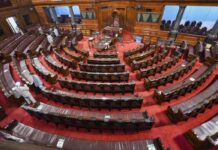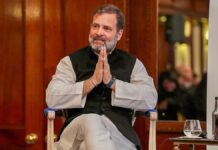Mumbai: The internal conflict between INDIA bloc allies, the Aam Aadmi Party (AAP) and Congress, played a significant role in the Bharatiya Janata Party’s (BJP) landslide victory in the Delhi Assembly Election 2025, Shiv Sena (UBT) stated in its mouthpiece Saamana. The editorial questioned the relevance of opposition alliances if their members continued to fight amongst themselves rather than challenging the BJP.
The BJP won a massive 48 out of 70 seats in Delhi, while AAP suffered a major setback, securing only 22 seats. Congress, which has been struggling in the state, failed to win a single seat for the third consecutive election. Saamana criticized both AAP and Congress for focusing more on attacking each other rather than defeating the BJP, which, according to the editorial, handed an easy victory to Prime Minister Narendra Modi and Union Home Minister Amit Shah. The editorial sarcastically remarked that if opposition parties continued this way, there was no need to form alliances at all.
The divide between AAP and Congress was evident throughout the campaign, with both parties launching attacks on each other. This internal strife, the editorial claimed, was not only damaging in Delhi but also had a similar impact in Maharashtra, where the BJP-led alliance won the 2024 state assembly elections. The piece further mentioned that a similar pattern had emerged in Haryana, where opposition disunity helped the BJP secure another win.
The editorial also raised questions about internal sabotage within the Congress, suggesting that some elements within the party might have deliberately undermined Rahul Gandhi’s leadership. It further criticized veteran social activist Anna Hazare for his remarks against Arvind Kejriwal, pointing out that Hazare’s anti-corruption movement had once helped Kejriwal rise in politics. Saamana accused Hazare of remaining silent on alleged corruption under the Modi government, citing issues like the Rafale deal and the Hindenburg report on the Adani Group.
The editorial concluded by warning that if opposition parties failed to learn from the Delhi election results, they would only strengthen what it described as Modi and Shah’s “autocratic rule.” It also noted that delays in seat-sharing discussions among Maharashtra opposition parties had created confusion, ultimately benefiting the ruling BJP. The piece sarcastically suggested that if opposition leaders continued to fight among themselves, they could take credit for enabling authoritarian governance, adding that there would be no need for even a Ganga dip to wash away their sins.








how can i get clomiphene how to get cheap clomid buy cheap clomid tablets clomid for low testosterone buy generic clomid can i purchase clomid without insurance where can i get generic clomid without prescription
I’ll certainly return to be familiar with more.
Thanks on putting this up. It’s understandably done.
azithromycin 250mg generic – ofloxacin drug order generic metronidazole 400mg
semaglutide 14 mg us – order semaglutide 14mg pill purchase periactin online
motilium over the counter – order domperidone buy flexeril tablets
buy augmentin 625mg – https://atbioinfo.com/ purchase ampicillin without prescription
generic esomeprazole 20mg – https://anexamate.com/ order nexium 40mg capsules
buy coumadin pills – https://coumamide.com/ buy generic losartan for sale
buy generic mobic 7.5mg – https://moboxsin.com/ meloxicam online order
deltasone for sale – corticosteroid deltasone generic
best non prescription ed pills – https://fastedtotake.com/ best drug for ed
cheap amoxicillin generic – https://combamoxi.com/ order amoxicillin generic
purchase diflucan generic – buy diflucan 200mg online order fluconazole 100mg without prescription
order escitalopram pill – buy lexapro 20mg pill purchase lexapro
order cenforce 50mg sale – https://cenforcers.com/# buy cenforce
tadalafil hong kong – cialis and dapoxetime tabs in usa cialis vs flomax for bph
what does generic cialis look like – https://strongtadafl.com/# what does cialis treat
order generic ranitidine 300mg – zantac order cheap ranitidine
More posts like this would create the online elbow-room more useful. este sitio
More articles like this would make the blogosphere richer. amoxil price
This is the kind of writing I truly appreciate. https://prohnrg.com/product/acyclovir-pills/
This is the stripe of serenity I enjoy reading. https://ondactone.com/spironolactone/
I couldn’t hold back commenting. Warmly written!
maxolon brand
More posts like this would persuade the online time more useful. http://images.google.ci/url?q=https://roomstyler.com/users/adipe
This website really has all of the tidings and facts I needed there this subject and didn’t know who to ask. https://myvisualdatabase.com/forum/profile.php?id=117929
purchase forxiga sale – https://janozin.com/ how to get dapagliflozin without a prescription
how to get xenical without a prescription – buy orlistat paypal orlistat over the counter
Palatable blog you possess here.. It’s hard to assign elevated quality belles-lettres like yours these days. I justifiably recognize individuals like you! Rent care!! http://shiftdelete.10tl.net/member.php?action=profile&uid=205583
More posts like this would bring about the blogosphere more useful. web
Proof blog you have here.. It’s severely to assign high quality writing like yours these days. I honestly respect individuals like you! Take vigilance!!
Đến với J88, bạn sẽ được trải nghiệm dịch vụ cá cược chuyên nghiệp cùng hàng ngàn sự kiện khuyến mãi độc quyền.
利用强大的谷歌蜘蛛池技术,大幅提升网站收录效率与页面抓取频率。谷歌蜘蛛池
Tham gia cộng đồng game thủ tại Go88 để trải nghiệm các trò chơi bài, poker phổ biến nhất hiện nay.
Với giao diện mượt mà và ưu đãi hấp dẫn, MM88 là lựa chọn lý tưởng cho các tín đồ giải trí trực tuyến.
Với giao diện mượt mà và ưu đãi hấp dẫn, MM88 là lựa chọn lý tưởng cho các tín đồ giải trí trực tuyến.
Tham gia cộng đồng game thủ tại Go88 để trải nghiệm các trò chơi bài, poker phổ biến nhất hiện nay.
betmgm RI https://betmgm-play.com/ mgm betting lines
Unveil the secrets to big wins with expert tips and guides. In crowns coins, loyalty rewards multiply your earnings. Start your winning streak today!
Sweet Bonanza tempts you with colorful symbols and explosive potential. Land sweet bonanza vs gates of olympus 8+ matches anywhere and watch the wins roll in. Spin for glory!
Ride the wave of wild wins in this timeless classic. play buffalo slot offers bonus herds, 27x free spin boosts, and golden grand prizes. Stampede ahead!
play chumba casino brings Vegas vibes straight to your phone. Claim free Sweeps Coins on signup and chase real cash redemptions. Fun never felt this rewarding!
No middleman. No delays. Just you, your crypto, and massive wins on stake dice . Join now and see why everyone’s talking about it.